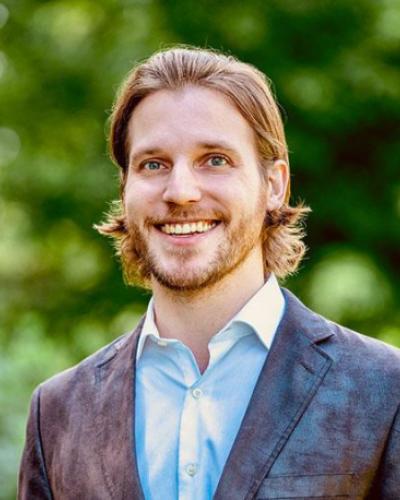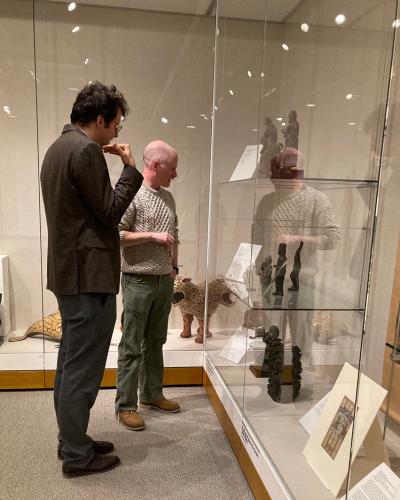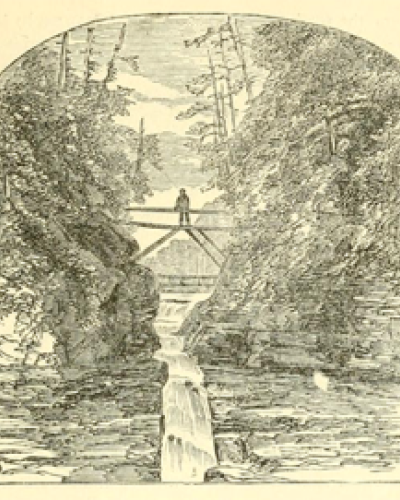Speakers
Marty Cain, Poet and doctoral candidate in the Department of Literatures in English at Cornell University
Nikki Wallschlaeger, Poet and author of three book-length collections: Waterbaby (Copper Canyon Press, 2021), Crawlspace (Bluff Press, 2017), & Houses (Horseless Press, 2015)
Transcript
Nikki (00:00):
Memories won't comfort me. Perhaps it's best not to trust the politics of people who haven't washed their own dishes in twenty years.
Marty (00:20):
I'm Marty Cain and you're listening to the Rural Poetics series on the Humanities Pod. In each episode, we focus on matters of rural poetry and small press literature, featuring interviews with publishers local to our own region of Ithaca, New York, and discussions and readings from rural poets elsewhere.
Marty (00:46):
Today I am really excited to feature a reading and an interview with the Wisconsin based poet, Nikki Wallschlaeger, who is also one of my favorite living writers. Nikki Wallschlaeger's work has been featured in The Nation, Brick, American Poetry Review, Witness, Kenyan Review, Poetry Magazine, and elsewhere. She's the author of the full-length collections Houses from Horseless Press in 2015 and Crawlspace from Bloof in 2017, as well as the graphic book "I Hate Telling You How I Really Feel," which came out in 2019 from Bloof. She's the author of an artist's book called "Operation USA" through the Baltimore-based book arts group Container, a project acquired by Woodland Pattern Book Center in Milwaukee, and her third collection, Waterbaby, is forthcoming from Copper Canyon Press in 2021. Her reading today will include works from that forthcoming collection. So let's get started!
Nikki (01:54):
"All Kinds of Fires Inside Our Heads": The number of bodies I have is equal to the number of gurney transfers that are televised. If we're all "just human" then who is responsible? A fire station drying out from addiction. Outside the drizzling of firepower, low-balling suns. It's like a sauna in here. The strain of a charred bladder. bottled water, bad wiring, that spark is no good. Come sit with me for a minute. My feet full of diluted axe fluid, thought I heard you say everything is medicine, but that's just hearin' what you want to hear. "Valley of Things": Hang your head when you walk. Yesterday's news is greener to survive ham with ideas of a common holiness decisions to make about what's going to siphon off your thoughts. Fuse giddiness to the citizen elective, creature by creature. When a very young child throws down an object, it's beautiful to watch. They don't know about the value of thingification, hanging over the riverbanks. A good poet prays to nature. I brush out tangles during graceful animal hunting season. Sometimes we hear a crush. Figure out a daily schedule, read tortured philosophers, listen to James Booker on repeat.
Nikki (03:44):
"Black Woman on a Plane, 21st Century": Minutiae in a bowl jerry-rigged hand in need of a drink, The flight attendant said, It’s on me, I must’ve looked like I needed one. Such a rough climb, wobbly as the sun during Leo season come to find out a brand new plane is hot to handle. The first breath: crucial, coughs. My favorite path of looking winds up when I’m in the air, there’s no way to vacuum seal death up here I suppose, even though I’ve never felt the urge to buy a traveling pillow. If something develops, if our machine defects, I’ll ask if I can hold the hand of the woman who gave me a drink. Then it’s time to land like nothings happened, the captain standing at the door with his crew. He’s younger than I am, a baby-faced white boy. We don’t know his name, or where he came from.
Nikki (05:00):
"Prayer Sonnet": Sewn up again in a data harvest meadow moving through me as pelvic bowl thunder to learn how to laugh at their indifference Revenge of the Chattel is not being shown in the popular gendarme art houses blood heavy as the iron binding us together public wordplay is called getting dragged the violence of daily metaphor in our very real world these solvent metaphors are true Hell investigates life with great opportunity my lil candle mouth kindling for the wounded when the stars are committed to the worst timing & no one wants to get out of bed in the morning.
Nikki (06:00):
"It's a Daisy": Bats twin the sky drowsy from billowing home to watch Night Court. I, Nikki, as a contemporary woman: is bound to ask who’s spiraling in the faucet. If you keep no-lye relaxers on your hair past the suggested time frame, the original crimple pattern becomes more defiant. Memories won’t comfort me, perhaps it’s best not to trust the politics of people who haven’t washed their own dishes in twenty years. O missile management, I request a transfer 4 the masses a happy howling cocktail showing instead of telling this country That. I. Cannot. With. You. A freed daylight may be possible, the revolt in us, I mean. Stems are still holding like a grown up but they snap. You pick me up, pour me another bath, a glass of something dry for the blisters, read Ted Joans’ Hand Grenades remember that I’m not the only one and cry.
Nikki (07:26):
"Notes on the New Reconstruction:" The stockroom only the cooks know. Bone bloc broth commiserating in plain view waters the climbing roses. Plantations are prisons & prisons produce plantations, how our runaway slave feet gotta close-read the tides. Ona Judge is in the West Wing hiding a pistol under the floorboards. My gods are always horrified by the living, but she say it’s better the devil you know than the devil you don’t. Perfecting their shiny shambolic tapestries, highly sophisticated ontological equipment cutting the gooseflesh of a bacon-wrapped fig inside a pig, rabid glory schemes narrated by their best bombastic hype agency on top of Capitalism Hill, Incorporated. A country surreptitiously playing itself with well-worn and well-torn secrets still plays itself. Homegirl was only twenty-two years old when she outwitted him. No one cares about a past that’s supposed to be done.
Nikki (08:39):
"Blue Flame of July": Can't fix what's beyond repair baby I know the feeling A broke clock is right twice a day don't mean I'm gonna be healing Any fool can make the rules any fool will follow them I know in my soul that's right Blue flame of July got me good I can't stop the lies Break me down before I become the same old fool I used to be Can't fix was beyond repair baby I know the feeling A broke clock is right twice a day don't mean I'm gonna be dealing If a group of fools makes the rules, all the fools will follow them Why can't we make better rules? watch the biggest fools swallow them I know in my soul, that's righteous Blue flame of July got us good we've got to keep it moving Break us down before we become even bigger fools than we used to be
Nikki (09:59):
"Dead to the World Study #2": Downstairs was where we distributed and organized the food. Cartons of ungovernable greens, carrots and potatoes, ripe figs, dusky apples. Hungry people were coming in from everywhere so we fed them It was a big complex that used to be an estate but now was a vibrant place full of life and dignity Airplanes landed and were able to attach themselves with ease, bringing supplies and visitors I was happy living there but that day I was on edge Tonight was the reading, and I was tasked with setting up a dinner for the two touring poets due to arrive in the late afternoon I left my post and went upstairs to The Tower where the permanent residents lived, passing my friends' quarters along the way I didn't like these poets They still associated the liberated mansions with opulence and leisure, even though the state had dissolved a year ago To be fair they weren't completely oblivious; their enchantment with this place was more gilded irony than anything else—but the general vibe of the duo continued to be stuck in the old language of server and those to be served I took my time getting ready When I got to the room where the reading was held, it already started The audience was interested, but the poets were annoyed it wasn't standing room only like they were used to The table was set with our best cutlery and sprays of ranunculus from the gardens When the reading was finished I was supposed to escort them to the dining area As I approached, they linked arms and looked above our heads for the nearest exit pretending they didn't see the gathering of people who wanted to break bread in their honor
Nikki (12:04):
"The Lunch Counter of Eternal Tears": Instead of crying on your shoulder I cry on the internet. Instead of crying I make allusions to crying by cherry picking the subjects. Instead of crying on his shoulder I build a fountain of black amethyst in an artificial square. Instead of crying I ring the bells of a bottomless road. Instead of crying I listen to Roy Orbison’s “Crying” because the way he waterfall-sings “crying” feels like a worn leather booth that wouldn’t refuse me service. Instead of crying I understand what I’m sacrificing for someone who’s long gone. Instead of crying I think of lurid romantic scenarios where I’m not crying and you’re the one being insufferable when you think about me. Instead of crying I listen to “Put Your Head On My Shoulder” by Paul Anka and I recognize how some songs are never about deep emotional connections with special people but for getting in the pants of willowy virgins. Instead of crying I put on “Live Evil” by Miles Davis to smudge the room of 1950s white nonsense. Instead of crying Miles’s trumpet screams like the last free lion dying alone in the wilderness. Can I lay my head on your shoulder and cry?
Nikki (13:39):
"Cows in the Morning": I hope cows have dreams it's not a solidness but a heaviness when they stand in the pastures allowing weight to drip into the sun flocked hay coercion brought us here but the hills smell good maybe there's a current flowing through here to thumb a cool ride on dream I'm preparing wobbling on my tongue the farmers finally letting them walk away from their sore tits and the mechanical suckling humans the drugs we're on to prevent days without maximum proclivity it's a hot spring morning the herd takes its time maintenance of relationships and empty coffee cups stretching their necks to get under the fencing tasting the free grass nodding in conversation with the passerby
Nikki (14:48):
"Lake Come and Gone": I'm in a kayak watching a man dressed as Uncle Sam waving around a plastic sword guiding the pontoon parade across the lake. It's a tradition to adorn boats with beer slides, streamers, and women wearing screenprint t-shirts that say "Lakegirl" in collegiate font. Despite the last four years of spiraling national leadership, the vacationers deliver convincing displays of loyalty, not exempt from doubts. As for me, the other side of the grand show, I'm trying to balance my life inside the kayak. It's their Big Day, the birth of a nation in crisis. Overhead, a bald eagle appears about fifty feet from our position—symbolic gesture too good, too perfect to be true—then I see three tiny birds attacking the eagle, driving it from their nests, the mild storms sashaying in, delaying fireworks until everyone is thinking of going home.
Nikki (15:59):
"Further Notes on the New Reconstruction": From the kitchens where the gas is kept beloved are the blues shining my shoulder old potholes knotted by masking the work. What I need for morning escapes as steam, night groaning over into a spume of dawn. To prepare a meal before the next sunrise means risking everything to write it down. Down the big halls through rivers & woods are devils cradled in an old palace of deals. Windbag so loud a people gets saturated on while we soothe a bisque of whispers. Electric stoves won’t get the job done but if that’s all you got—we can downlink fire, like two dense stars shifting the dark fields confronting desolation 130 billion years ago. But the recipe (in theory) is pretty simple. What it takes is a relish for a new undoing eventually you’ll get what you set out to do. Stone soup: also known as politicians wheel. A hypogeal bone forged by Black Sisypheans who were smart enough to realize when they reached the top of their blinking mountain all they had to do was step aside and the rest would take care of itself.
Marty (17:34):
All right. Thank you so much, Nikki. I love those poems. I'm really excited to see them in a book when they come out. That actually works well that you're reading from Waterbaby because the first question that I wanted to ask you had to do with that book, which is going to be your third full length, and I'm curious if you could talk a little bit about the process of writing it and whether or not you see it as a departure from the kind of concerns and formal approaches of your first two books.
Nikki (18:09):
I started writing this book shortly before my grandmother died while I was still finishing Crawlspace. And what's different about this one is all the poems have different titles. I realized I was getting a little caught up in refusing to do that. So with this book, I wanted to do that. But my concerns are the same--my politics, you know. I guess only growing and more rage and frustration. But this book was mostly also written in the country after I moved out here to a rural area. So there's a different rhythm to it. It's a different pace, a slower pace.
Marty (18:56):
Yeah. That's fascinating. Since you wrote Houses you moved from Milwaukee to the Driftless region of Wisconsin, right? Which is a pretty significant change, and I'm wondering if you could talk a little bit more about whether that's changed your writing process, your kind of concerns as a poet and just kind of the way that you engage with poetry in your daily life.
Nikki (19:21):
For me moving out here, decreased my anxiety. So I feel, you know, there's more, there's more space for me to write these poems and I have more time. I don't feel so cramped in by the city and its various problems and all the violence and stuff in my old neighborhood. So that's really nice. So it's less anxiety, I guess. I can stop, take a step back a little bit and not be as emotionally involved, even though I am. It's just, it's less urgent. It's a distance that I needed in order to not just write poems where the rhythm was like a little too fast sometimes. Like my first two books--I can't stay there all the time, it's a lot. I guess, you know, just living out in the country, I can breathe here and that reflects like the pace of how I write. It takes longer to write my poems, which is fine. I don't mind, but I'm still writing prolifically.
Marty (20:43):
So as someone who has an interest in rural literature, one of the things that I've always loved about your work is that even when you're writing about cities, I feel like I'm learning about things that pertain to the rural and to geographic space more broadly. In other words, the city doesn't feel like this kind of naturalized space that is taken for granted in the way that it is for a lot of other poets. One example I have in mind is the last poem in Crawlspace where you call for the abolition of restaurants and it becomes this broader way of thinking through urban capitalist food culture and its kind of extractive relationship to rural agriculture. I would say that the rural and the urban feel very enmeshed in your work a lot of the time and I'm curious, is that something that you're thinking about consciously? Do you have more to say about that?
Nikki (21:39):
Totally. Well, when I lived in Milwaukee, there's a broad tradition of cooperatives there. A lot of the people there are environmentally minded and really radical about that. There's a small food co-op that has been there since the seventies and I would volunteer there, just a lot of food justice things and you can't have food justice without the rural. So, you know, I came from that and also I was involved in community gardens and stuff there., And then my hometown, like where I grew up, was a town of like 30,000 people and then I had farmers in my family and when I was a little kid, I would go out to their farms and stuff. My mom always loved nature. We used to go fishing. So that's always been a part of my life. It's just who I am. I'm a very conscious of nature and the rural, it's just a part of me. A city is just a bunch of buildings on rural land or if it's even "rural land"--it's just earth! So in some ways the urban is sometimes like an illusion or a façade.
Marty (22:53):
So on the subject of rural agriculture, you have a number of poetic works about food, perhaps the most obvious example, being "Pizza and Warfare," which you did with garden door press, which we're going to do a reprint of in the coming months, so that's something for our listeners to be excited about. You've alluded to this already, but I'm curious about why food is such a poetically generative subject for you. Is that something that you have more to say about?
Nikki (23:28):
Wisconsin, there's just farms everywhere and I live in an area now where Organic Valley is based--like their headquarters is here--and they're a billion dollar company now. I think they are the largest organic dairy producers in the country now. So that's all over, just this emphasis on eating what's local, as opposed to like globalization, where you're eating something that's from another hemisphere and just how wasteful and problematic that is with, you know, pesticides and things like that and big agriculture and stuff and how unhealthy it is and how it makes people sick. It just doesn't make any sense. It makes no sense... Like when you can grow your own. I'm definitely an amateur gardener, but I hope to change that. But that kind of mindset has been around in the environments that I lived in for decades. So it's, you know, it's just something that just, once again, it's common sense that you would feed people locally first before sending out the produce somewhere else to make money.
Marty (24:54):
I want to move back for a second to Waterbaby. One of the things that I'm sort of curious about is your first two books were with small presses that only publish a handful of collections a year--Bluth and Horseless. Copper Canyon is comparatively bigger and arguably reaches a larger readership with their distribution. How has that been so far? Like what does that move to a larger press been like, has that been an adjustment for you?
Nikki (25:25):
They've been really great. I'm more than happy about where I am. Everyone is getting my input and we agree on decisions together, but it's mostly about what I want and I'm honored to be there. It's been a really positive experience. There are a great press and they've published so many wonderful poets throughout the years and I can't even believe it's real.
Marty (26:00):
It's really exciting that I'll be able to like go into an independent bookstore or even a Barnes & Noble and be like, "Oh, like here's a poet I like," who is not like Mary Oliver or whatever is usually there. One of the things that is great about presses like Copper Canyon and Graywolf is that issue of distribution--that's your chance to see some really excellent work in a broader context. So I'm really excited about that as well, and they're lucky to have you! One more question I have, which is maybe pertinent as we're doing this over zoom--one thing I'm interested in is the way that poets in rural spaces engage with technology in order to kind of form social bonds across geographic space. You don't really strike me as of the kind of mindset of the poet as this kind of lone wolf figure. You seem pretty involved in poetry as this kind of communal endeavor and you're also very active on social media. Has the internet been helpful for you in finding your own poetic community? Particularly as someone who lives in a rural space now?
Nikki (27:32):
Absolutely. It was in the city, too. I like my space, I do love solitude, but you have to have a balance with that. And there's poetry community kind of stuff going on out here. There's the writing center, and Hanif Abdurraqib came out here last year and read. I want to do more organizing readings with them, but you know, pandemic. There's a lot of art things going on out here, so it's great. It's not what I expected. It's better than I expected. And this place continually surprises me. There's like a lot of interesting people, but you gotta seek them out or you just end up meeting somebody randomly one day, because everyone is spaced apart a little. It's fun, it's a lot of fun.
Marty (28:48):
We've been talking today with Nikki Wallschlaeger, a Wisconsin-based poet and the author of Crawlspace, out now from Copper Canyon Press. Rural Poetics is part of the Rural Humanities Initiative, which is funded by the Andrew W. Mellon Foundation and housed at Cornell's . Our thanks go to Cornell's College of Arts and Sciences and the Cayuga Nation, on whose land Cornell resides.





